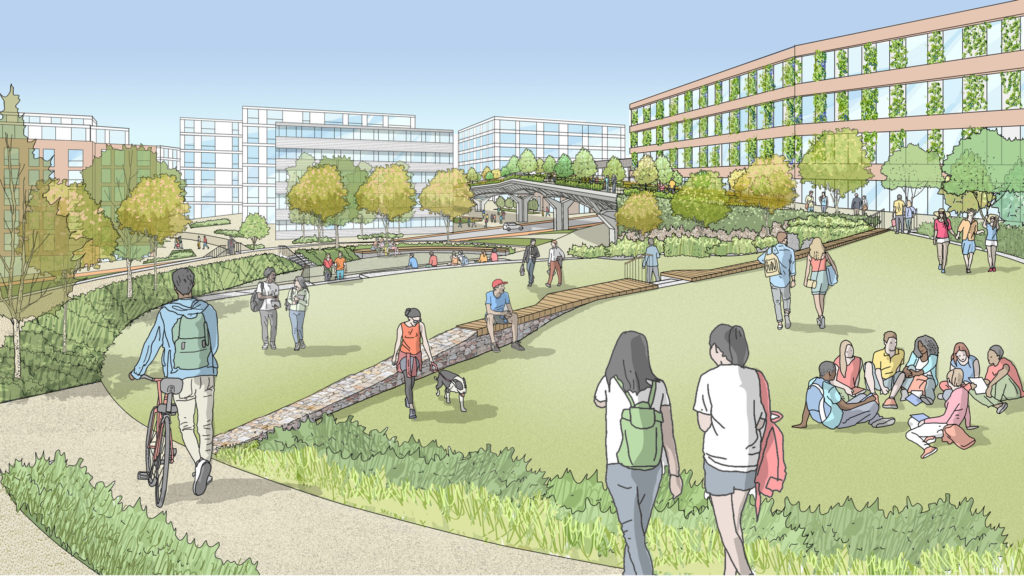Whether global or local, innovation-led regeneration should unlock opportunity
15.10.24 4 min read

The UK’s innovation pedigree is genuinely world leading. Our universities, across every region of the country, form dynamic clusters of research and teaching – educating the next generation of thinkers and doers.
However, universities are much more than that. They are engines of regional and national growth, and so can play a leading role in the regeneration of our towns and cities.
Not only do universities employ thousands, but they also support a young and diverse community and attract industrial partners keen to take advantage of research, innovation, and skills.
Both the previous and current Government have recognised this. Investment Zones, originally announced in 2022 to cultivate high growth clusters, have been backed by the Labour Government but require a university partner in a public-private-academic model.
In her Party conference speech last week, Angela Rayner confirmed Investment Zones for advanced manufacturing and life sciences in the West Midlands and West Yorkshire respectively.
Inspired by high growth areas such as Silicon Valley, Investment Zones cluster innovation, research, industry, and the public sector in a way which supports long-term regeneration, economic growth, and area-wide placemaking.
Importantly, we don’t need Investment Zone status to make that happen.
We are already working with the University of Salford and the University of Warwick to leverage innovation and create opportunity in the North West and West Midlands – at Crescent Salford and Arden Cross.

Arden Cross
At Arden Cross, a £3.2bn regeneration opportunity facilitated by the HS2 Interchange in Solihull, the University of Warwick is set to be the lead academic partner for a new HealthTech Campus. This, in turn, will anchor an innovation district right in the heart of the country.
Given the strength of life sciences in the West Midlands, there is little doubt this is both needed and will be successful. It’s an opportunity to cluster startups and scale ups, funding partners, and the public sector.
Of course, we must deliver the labs and collaborative hubs universities, and researchers, need to succeed. However, we also need to think long-term about wider commercial opportunities, where business and industrial partners could co-locate to take advantage of the spillover effects of university-led regeneration.
We need to consider the delivery of homes which meet the requirements of an international and mobile workforce, but also established communities whose skills are fundamental to attracting future investors and employers.
We also need to think bigger when it comes to connectivity – not just local, but regional, national and international.
Arden Cross has immediate access to road, rail, and air connections but they still need to be integrated in a way which best enables growth and facilitates competition with hubs right across Europe and the world.
Whilst the innovation proposition at Arden Cross is in its early planning stages, Crescent Salford is a more developed example of industry, innovation, and the public sector coming together.

Salford Crescent
Sat within Salford’s Innovation Triangle, and part of a wider £2.5bn masterplan, plans for Crescent Innovation were approved in July 2024. The plan includes delivery of 1.7m sq ft of commercial innovation, academic, and research space – as well as 933 new homes, improvements to public spaces, and a new movement hub.
The vision for Crescent Innovation has been brought forward by the Crescent Partnership. This is made up of ECF – a partnership between Muse, Homes England, and Legal & General – Salford City Council, and the University of Salford.
Spanning 29 acres, the creation of an innovation ecosystem will build world-class research and development capabilities, as well as driving economic growth across the city and region.
It means jobs and opportunity for local people, whilst putting Salford on the map as a destination for the world’s best and brightest.
Across the world, the best examples of innovation hubs – from Silicon Valley to Tokyo-Yokohama – bring together the public, private, and academic partners. Creating the right conditions for them to thrive is critical, as is ensuring the benefits of growth are felt at every level of society.
If the UK is to continue to compete on a global stage, in a way which drives social value for our communities, innovation should be at the heart of our approach to regeneration.